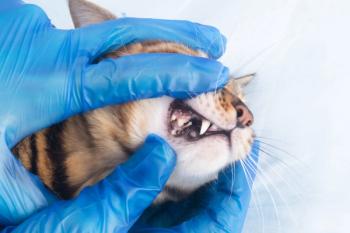
Whisker fatigue: Did pet bowl companies invent a feline malady?
The New York Times says whisker fatigue is plaguing cats. The solution? A $40 feeding dish.
Getty Images
Has the term "whisker fatigue" sprung up in your client conversations lately? Or perhaps you've seen headlines in mainstream media referencing the term? It may be because of a June 5 New York Times article titled "
The article defines whisker fatigue as "a fairly new diagnosis, one that many (but not all) veterinarians take seriously. When cats have to stick their faces into deep bowls and their whiskers rub up against the sides, the experience can be stressful, prompting them to paw the food onto the floor, fight with other cats or grow apprehensive at mealtimes."
It goes on to report a pet owner's account of solving troubling feeding issues (due to whisker fatigue, of course) after much internet research and self-diagnosis. Three pet bowl manufacturers (
The bowls featured in the article are made of stainless steel (which is better than plastic for preventing
So yes, while steel is better than plastic, and an individual cat may prefer to eat out of a larger bowl, is there any credibility to the Times article? The only sources interviewed have a vested interest in selling their products. As one representative assured the Times reporter, "Whisker fatigue is a real thing."
The article's thin sourcing led Boston Magazine reporter Chris Sweeney to call out the Times in his piece "
A Tufts spokesperson told Sweeney that several members of the faculty were not familiar with whisker fatigue as a diagnosis, but the experts at the school's clinical nutrition service said that "there are many medical reasons for a cat's appetite to change, and it's important to investigate and address concerns with a veterinarian."
AVMA president Thomas Meyer, DVM, MS, echoed the sentiment that changes in eating behavior are a matter of concern and should be addressed with a veterinarian, but he added, “While a cat's whiskers are very sensitive, there is currently no evidence showing that whiskers rubbing against food bowls causes cats stress or discomfort."
Sweeney also searched the Journal of the American Veterinary Medical Association, American Journal of Veterinary Research and the International Journal of Feline Medicineand Surgery for the term and turned up zero results.
We at dvm360.com were also on the skeptical side, so we reached out to Elizabeth Colleran, DVM, MS, DABVP (feline), American Association of Feline Practitioners board member and feline-only practice owner, to see if she, a bona fide cat expert, had ever heard of the condition. Colleran said the Times article had made the rounds of feline practitioners and she agreed with the Tufts nutritionists: "A change in appetite is a serious symptom and should be fully and carefully investigated."
That said, whiskers serve many functions for cats, Colleran continued. "As sense organs with a high degree of specialized nerve endings that are quite sensitive, one could make the case for overstimulation of whiskers causing some unpleasantness. But, there is absolutely no data to support it as 'a thing,'" she told us.
So while cat owners mean well and most want the best for their pets, gentle education and a full examination is likely the best course of action if they call your clinic seeking advice about "whisker fatigue."
Newsletter
From exam room tips to practice management insights, get trusted veterinary news delivered straight to your inbox—subscribe to dvm360.





